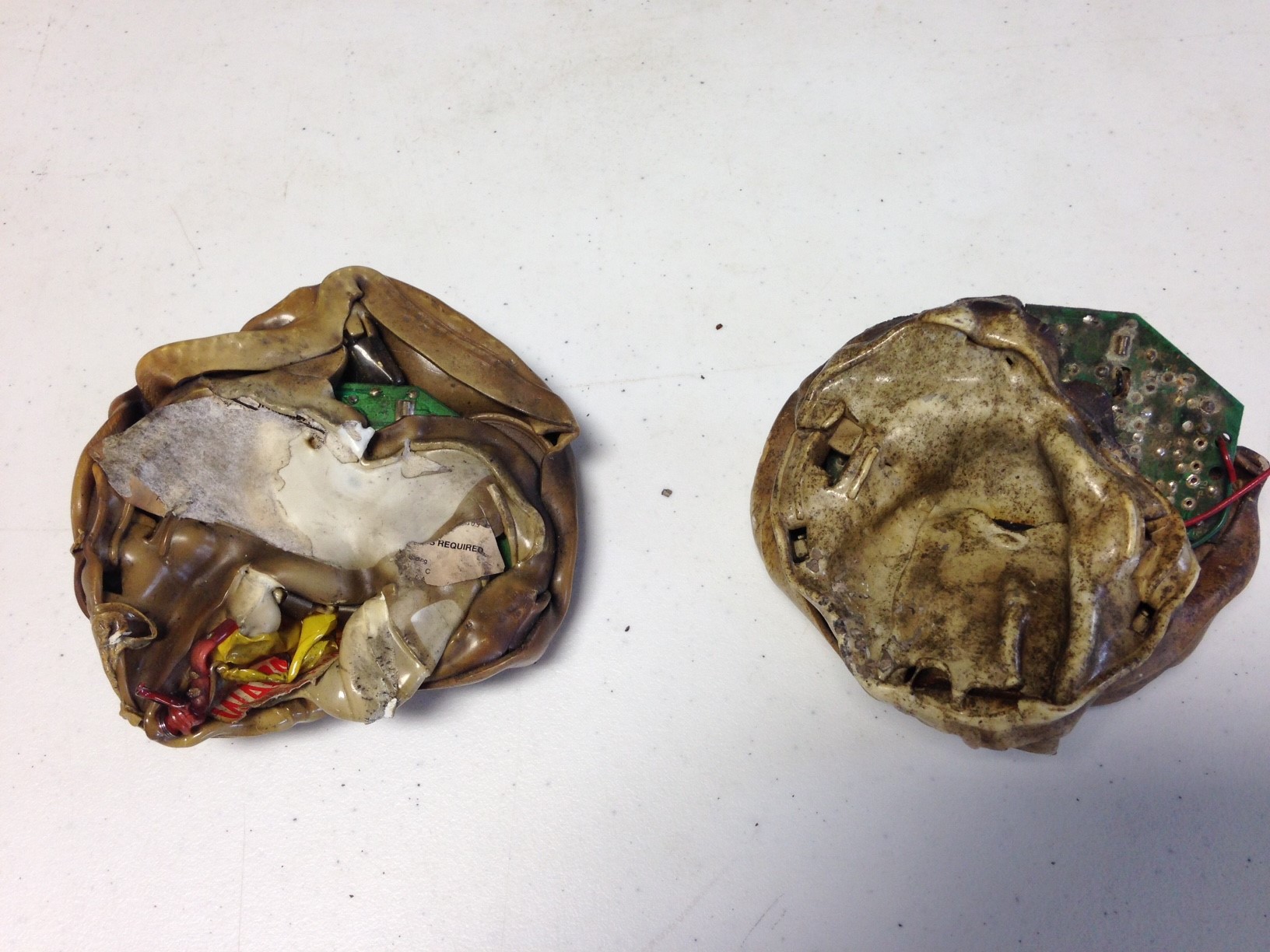House fires will kill about 3,000 Americans this year. Surprisingly, more than a third of the victims will have at least one working smoke detector
in their home or apartment. Ever wonder about the durability of your smoke detector? Jackie Ireland picked up a nice picture of this alarm from the Fairfield Volunteer Fire Department -
It was still alarming when the firefighters extinguished the fire.

That smoke detector outside your bedroom door could be giving you a false sense of security. It might not sound quickly enough to get you up and out if there’s a fire when you are asleep.
It feels like heresy to question the value of smoke detectors. Clearly, these are life-saving devices. But some of the nation’s firefighters are doing just that.
They’re on a crusade to get people to change the type of alarms found in most homes.
Smoke alarms 101
•Install smoke alarms on every level of your home, including the basement, making sure that there is an alarm outside every separate sleeping area.
•Mount smoke alarms high on walls or ceilings (remember, smoke rises). Ceiling mounted alarms should be installed at least four inches away from the nearest wall; wall-mounted alarms should be installed four to 12 inches away from the ceiling.
•If you have ceilings that are pitched, install the alarm near the ceiling's highest point.
•Don't install smoke alarms near windows, doors, or ducts where drafts might interfere with their operation. Do not install in or near cooking areas or bathrooms.
•Test smoke alarms at least once a month.
•Dust smoke alarm vents regularly to prevent particles from blocking sensors.
•Never disconnect a smoke alarm or remove the batteries for any reason, except to change them.
•Replace the batteries in your smoke alarm once a year, or as soon as the alarm "chirps," warning that the battery is low.
•Smoke detectors get old. Replace them every 10 years or as the manufacturer recommends.
Source: Underwriters Laboratories: proper smoke alarm use
House fires will kill about 3,000 Americans this year. Surprisingly, more than a third of the victims will have at least one working smoke detector in their home or apartment.
How could this be?
As it turns out, not all smoke alarms are the same. There are two basic types of detectors: ionization and photoelectric. Ionization models are quicker to spot flaming fires.
Photoelectric models react more quickly to smoldering fires, the kind caused by a cigarette on the couch or an overloaded extension cord. These smoldering fires produce toxic
gases that can kill people sleeping in the house before there are any flames.
While any smoke detector is better than nothing, a growing number of experts favor photoelectric or dual-mode alarms to guard against both fire and smoke.
Nine out of 10 homes in the U.S. have ionization alarms. There are two reasons for this. They are cheaper to buy, and fire departments across the country have given them away for decades.
Comparison tests show differing results
Many safety experts believe either type of smoke detector is adequate, as long as the unit is working properly. Six years ago, the Commerce Department’s National Institute of Standards
and Technology conducted an extensive test. The report said both ionization and photoelectric detectors “consistently provided time for occupants to escape from most residential fires.”
Others disagree. For almost 20 years, B. Don Russell, a professor of electrical engineering at Texas A&M University, has studied smoke alarms.
He uses a full-scale test facility to see how the detectors respond to different fire conditions and various materials. Russell says there is little difference
between the two types of alarms when there’s a flaming fire, but his tests show ionization alarms are dramatically slower when it comes to smoldering fires.
“When you’re asleep, you need the earliest possible warning to get out and you do not get that with just an ionization detector,” Russell says. “So if you were going to pick
a single smoke detector to put in your home, pick a photoelectric detector.” http://engineering.tamu.edu/news/2012/10/05/russell-featured-on-nbcs-today-show-discussing-smoke-detector-inadequacies
Building codes changing
In Massachusetts, new or renovated homes or apartment cannot rely solely on ionization alarms for fire protection. If a detector is within 20 feet of a kitchen or bathroom, it must be
photoelectric. It took Boston’s deputy fire chief Jay Fleming years to get the law passed. “Any smoke detector is better than nothing.” Fleming says. “I don’t want anyone to throw out
what they have. But there’s an alternative out there that for only a few dollars more works better than what most people have in their homes.”
Nuisance alarms
Tests also show photoelectric alarms are less prone to nuisance alarms. Studies show that as many as a third of all smoke alarms in U.S. homes are disconnected, which could
account for hundreds of fire deaths each year. People often remove the batteries when cooking or moisture from the bathroom causes the alarm to sound when there’s no danger.
You want that alarm to go off when there’s a threat to your life, not when you’re cooking a steak.
The bottom line: Consider dual detectors
Many safety experts recommend a smoke alarm with both an ionization and photoelectric sensor. These combination models, which are widely available, guard against both flaming and smoldering fires. That way you’re protected no matter what type of fire you have.
Consumer Reports recommends replacing ionization units with these new dual sensor models. http://www.propertyevaluation.net/Photoelectric%20Alarms-%20Jay%20Fleming.html
More information on this topic
http://www.ul.com/code-authorities/fire-code/smoke-alarms-and-smoke-detectors/
https://www.usfa.fema.gov/prevention/outreach/smoke_alarms.html smoke alarm outreach materials
http://www.consumerreports.org/cro/co-and-smoke-alarms/buying-guide.htm Consumer Reports buying guide
http://www.consumersearch.com/smoke-detectors Smoke Detector Reviews
http://engineering.tamu.edu/news/2012/10/05/russell-featured-on-nbcs-today-show-discussing-smoke-detector-inadequacies Dr. Russell featured on NBC's Today Show discussing smoke detectors
http://www.nbcnews.com/id/40240039/ns/business-consumer_news/t/what-you-need-know-about-smoke-alarms/#.V7HIJNL2bZ4 Consumer Man- What you need to know about smoke alarmshttps://www.usfa.fema.gov/downloads/pdf/smoke_alarm_infographic.pdf Fema Infographic in English
https://www.usfa.fema.gov/downloads/pdf/smoke_alarm_infographic_spanish.pdf Fema Infographic in Spanish